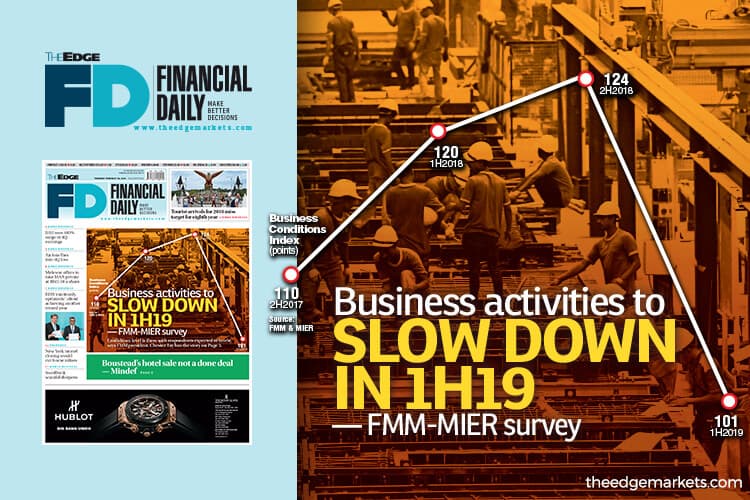
This article first appeared in The Edge Financial Daily on February 28, 2019
KUALA LUMPUR: A business condition survey carried out jointly by the Federation of Malaysian Manufacturers (FMM) and the Malaysian Institute of Economic Research (MIER) shows that business activity is expected to slow down in the first half of 2019 (1H2019).
FMM president Datuk Soh Thian Lai said respondents were more cautious about the outlook for 1H19, with the survey’s Business Conditions Index declining 23 points to 101 points, from 124 in 2H18.
Meanwhile, the Local Sales Index fell to 94 points from 113 in 2H18, while the Export Sales Index dropped to 105 points from 122, indicating weaker demand.
Nonetheless, Soh said capital investment was higher in 2H18, and is expected to be similar in 1H19.
“This is despite growth slowing down, but our respondents are still expected to be investing. It means the confidence level is there,” he said at a media briefing yesterday.
“Growth is still there but at a slower pace. The expected index for employment also fell to 105 points in 1H19 (from 116 points in 2H18), signalling a slowdown in hiring. Only 20% of respondents indicated that they will likely increase their headcount, down from 27% in the previous survey,” he said.
Soh said among the industries that are likely to be hiring are electrical and electronic, petrochemical, transport and warehousing, aerospace, and halal food industries.
In 2H18, however, the survey shows that business conditions picked up after the 14th general election compared with 1H18.
“Production volume and capacity utilisation shifted higher in 2H18 but are expected to slow down in 1H19 on weaker demand, while cost of production continues to be on an upward trend,” he said.
Moving forward, Soh commented that government policies should focus on promoting economic growth while reducing cost of doing business.
“They should also increase the confidence of foreign and domestic investors, introduce business-friendly policies, and ensure that they are committed to institutional reforms, especially in terms of anti-corruption,” he said.
On trade tensions between the US and China, most respondents of the survey said they were not affected by it.
“About 63% said their exports are not affected at all, 18% responded positively, while 17% negatively. Meanwhile, 73% of respondents said there was no impact on imports, [with] only 15% affected negatively and 11% positively,” he said.